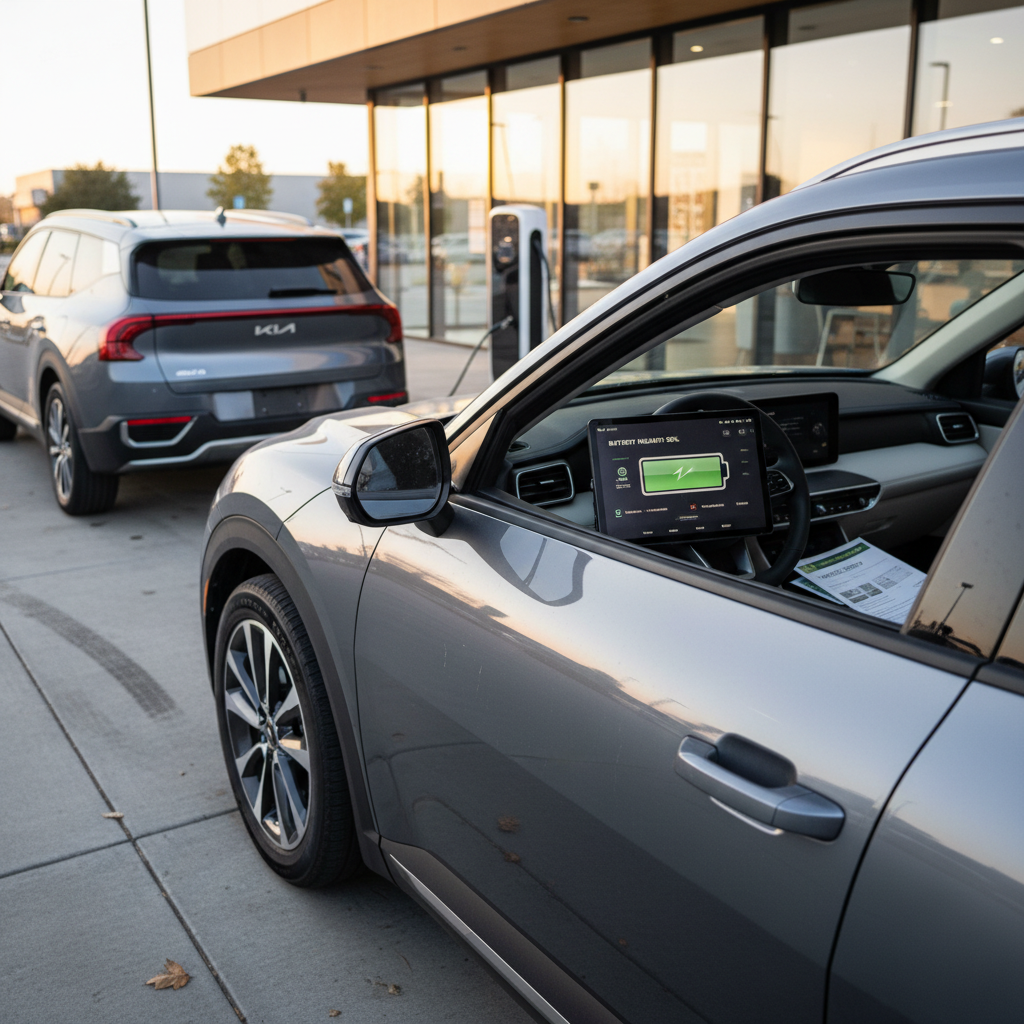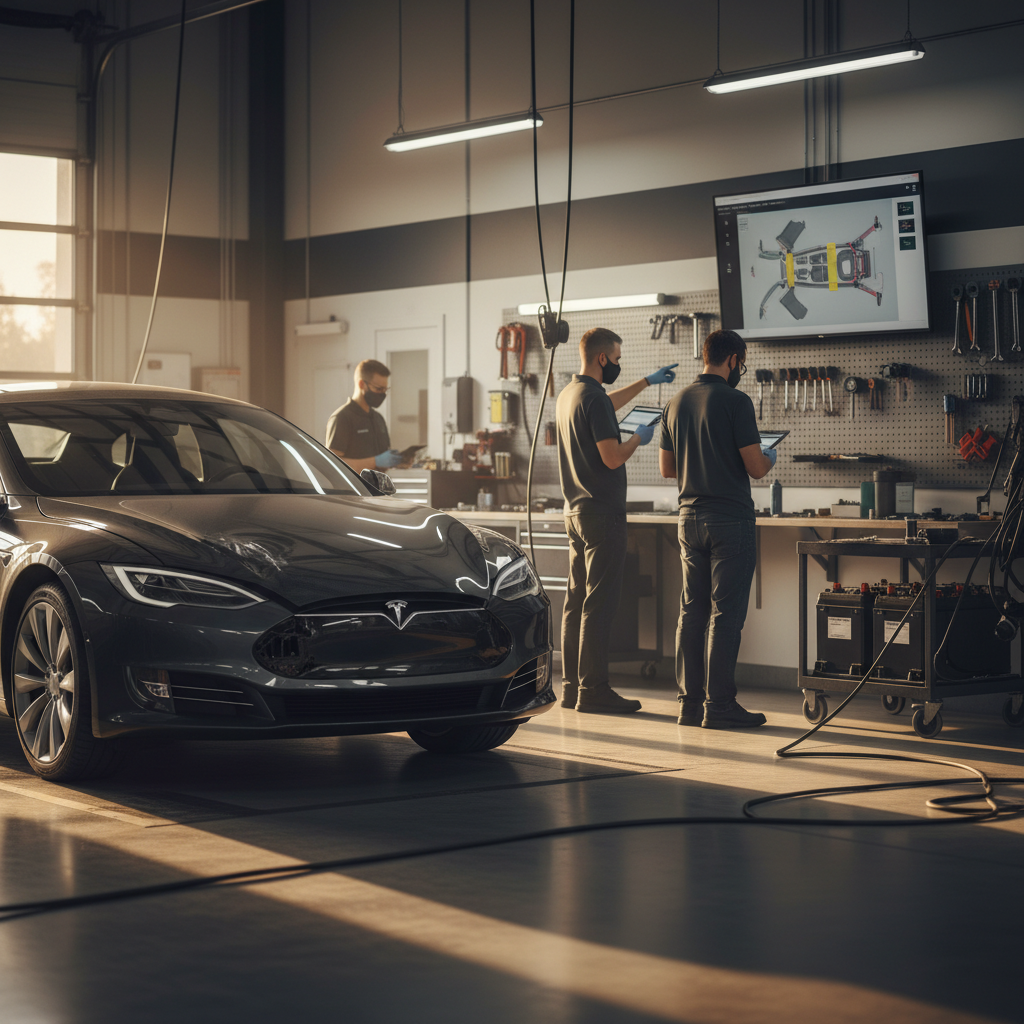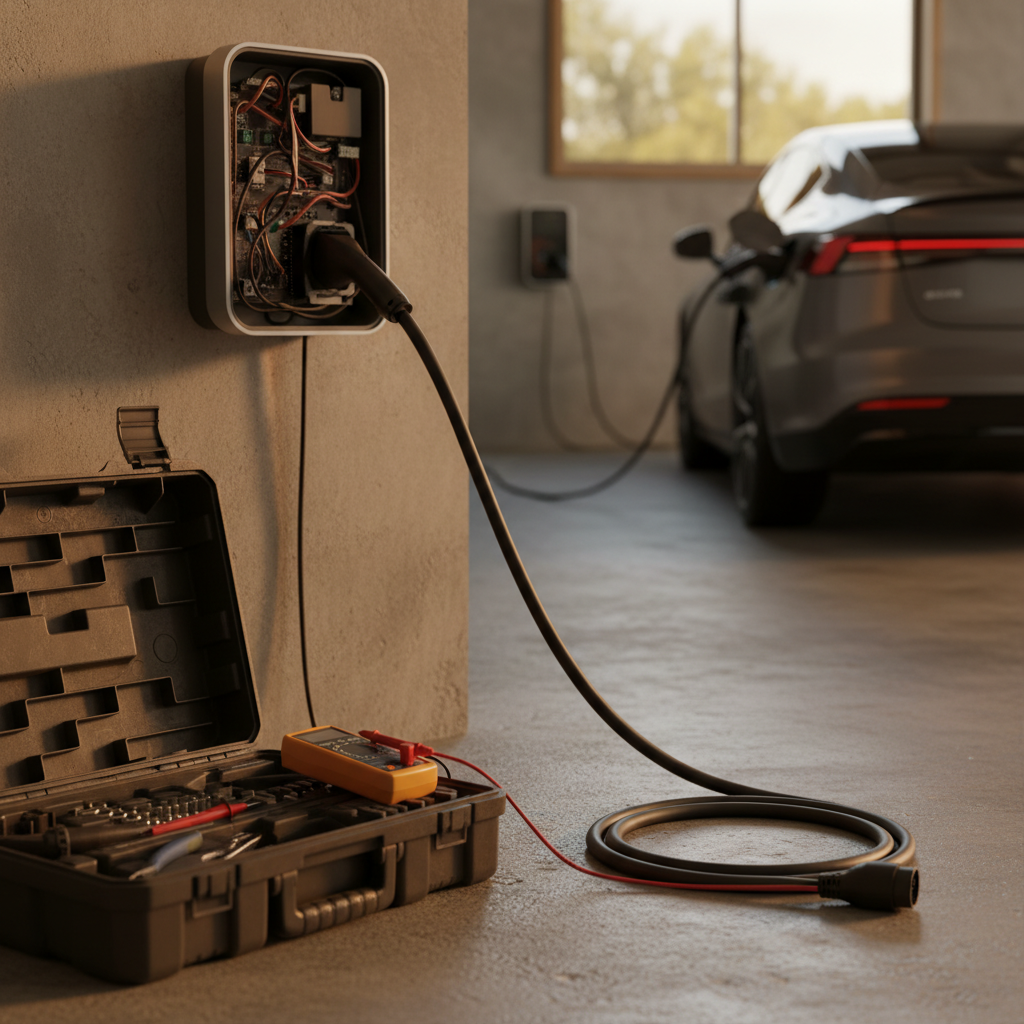If you’re typing “SUV for sale near me” into a search bar in 2025, there’s a good chance you’re also wondering whether your next family hauler should finally be electric. The good news: used electric SUVs have never been more available, more affordable, or easier to shop for, especially if you know what to look for and where the traps are.
Quick snapshot
Why “SUV for sale near me” is quietly going electric
Scroll any classifieds for long enough and you’ll notice a shift: where there used to be rows of thirsty V6 crossovers, you now see Tesla Model Y, Ford Mustang Mach‑E, Kia EV6, and other battery‑powered SUVs mixed right in with the gas crowd. That’s not an accident; automakers have spent the last five years pushing EV development into exactly the body style Americans love most, compact and midsize SUVs.
Electric SUVs are now mainstream, not fringe
The result is a used‑car market where you can shop SUVs the way you always have, by size, budget, and comfort, but now with quiet drivetrains, low running costs, and serious performance thrown in. The trick is understanding which used EV SUVs make sense for your life, and how to judge a battery pack the way you once judged a timing belt.
Why a used electric SUV often beats a new gas SUV
Used EV SUV vs new gas SUV: the real world trade
Same money, very different ownership experience
Lower running costs
Electricity is usually cheaper per mile than gasoline, and EVs have far fewer moving parts. No oil changes, no exhaust, no transmission service. Over 5 years, a used EV SUV can save you thousands compared with a new gas SUV of the same price.
Instant torque, calmer commute
Even mainstream EV SUVs jump off the line with a kind of effortlessness that makes gas engines feel a bit last decade. Smooth, silent acceleration and one‑pedal driving turn gridlock into something closer to gliding.
Cleaner conscience, future‑proof choice
As more cities experiment with emissions rules and more employers add on‑site charging, owning an EV SUV is increasingly the easy, future‑proof option. Buying used simply lets you skip the early‑adopter markup.
Value sweet spot
In other words, if you’re shopping that $25,000–$35,000 price band where new compact crossovers live, you can often step into a well‑equipped used EV SUV with more tech, more performance, and much lower operating costs. Same monthly payment, very different experience.
Top used electric SUVs to look for near you
Your local results for “SUV for sale near me” will vary, but a few used EV SUVs show up again and again because they hit the bullseye on range, practicality, and price. Here are the headliners you’re likely to see on real‑world lots and marketplaces.
Used electric SUVs you’ll see most often
Approximate used price ranges assume clean history and typical mileage in late 2025. Local prices will vary.
| Model | Typical Used Price | EPA Range (approx.) | Seats | Why it’s a great used buy |
|---|---|---|---|---|
| Tesla Model Y (2020–2024) | $26,000–$31,000 | 260–330 miles | 5 | The default modern family EV: spacious, efficient, and supported by Tesla’s vast fast‑charging network. |
| Ford Mustang Mach‑E (2021–2024) | $22,000–$27,000 | up to ~320 miles | 5 | Sporty feel with SUV practicality; older examples now heavily discounted versus new but still tech‑rich. |
| Kia EV6 (2022–2024) | $20,000–$25,000 | up to ~310 miles | 5 | Superfast DC fast charging on 800V architecture, sharp design, and generous remaining warranty. |
| Hyundai Ioniq 5 (2022–2024) | mid‑$20Ks+ | ~220–300 miles | 5 | Roomy, retro‑futurist cabin and easy road‑trip manners; a favorite among reviewers for comfort. |
| Kia EV9 (2024–2025) | $51,000–$56,000 | ~230–300 miles | 6–7 | One of the only three‑row EV SUVs; expensive but an outstanding do‑everything family hauler if your budget stretches. |
Focus on range, interior space, and warranty rather than just year and trim name.
Watch the outliers

How to search smart: local dealers vs online EV marketplaces
Local dealerships & lots
If you plug “SUV for sale near me” into your map app, you’ll mostly see traditional dealers and independent lots. The upside is obvious: you can sit in the thing, drive it, slam the doors, and see how the seats treat your lower back.
- Pros: Immediate test drives, potential for trade‑in on the spot, localized pricing knowledge.
- Cons: Limited EV selection, sales staff who may not be EV experts, and inconsistent transparency about battery health.
Online EV‑focused marketplaces
Dedicated EV platforms like Recharged are built for shoppers who want more data and fewer surprises. Instead of driving lot to lot, you can see nationwide inventory filtered by body style, range, price, and more, then have the SUV delivered to your door.
- Pros: Larger EV‑specific selection, detailed battery health reports, transparent pricing, remote paperwork, and home delivery.
- Cons: You’re test‑driving fewer vehicles in person, so you need to rely on great photos, reports, and return policies.
Where Recharged fits in
Battery health, range, and what really matters
With gas SUVs, you worried about transmissions and head gaskets; with used electric SUVs, the main character is the battery pack. The drama is mostly overblown, modern packs are engineered to outlast finance terms, but you still want hard numbers, not vibes.
Three battery questions to answer before you buy
If a seller can’t answer these, walk away or get an independent report.
How much capacity is left?
Think of this as the battery’s report card. A good used EV listing should share state of health (SoH) or similar data, ideally based on an independent diagnostic, not a guess.
What’s the realistic range for me?
EPA numbers are lab results, not gospel. Consider your weather, highway vs city driving, and how often you’ll road trip. A 260‑mile SUV is effectively a 180–220‑mile SUV in fast highway use.
Is the battery still under warranty?
Many EVs carry 8‑year/100,000‑mile battery warranties (sometimes longer). Check the in‑service date and mileage; a warrantied pack is a huge safety net.
What the Recharged Score tells you
- Aim for a battery that’s retained the vast majority of its original capacity (exact numbers vary by model, but modest degradation is normal).
- Be wary of heavily fast‑charged vehicles with unusually high mileage for their age unless the price reflects it.
- If you live in a cold climate, expect winter range to drop noticeably and factor that into your daily‑range needs.
Pricing, financing, and the real cost of ownership
Sticker price is only half the story. A used EV SUV might look pricier than a comparable gas SUV at first glance, but the real question is: what’s the total cost of owning the thing for the next 3–7 years?
Typical 5‑year cost comparison: used EV SUV vs new gas SUV
Illustrative example assuming U.S. average electricity vs gasoline costs; your numbers will vary by region and driving habits.
| Cost Category | Used EV SUV (approx.) | New Gas SUV (approx.) |
|---|---|---|
| Purchase price / depreciation | Higher initial price, slower depreciation after big early drop | Lower initial price, but may lose more value percentage‑wise |
| Fuel / energy | Significantly lower (electricity, home charging) | Substantially higher (gasoline, especially if you commute) |
| Maintenance | Lower: no oil changes, fewer wear items | Higher: fluids, belts, exhaust, transmission service |
| Tax incentives | Used EV incentives have changed and may be limited locally; check state programs | Some hybrids may qualify; traditional gas SUVs generally don’t |
| Total 5‑year cost | Often lower, especially for high‑mileage drivers | Often higher once fuel and maintenance are included |
Focus on total monthly outlay, not just purchase price.
Use payment, not price, as your yardstick
Recharged can help you pre‑qualify for EV‑specific financing, estimate your real monthly costs, and even factor your trade‑in into the equation. That way you’re comparing full budgets, not just two scary MSRPs in isolation.
Inspection checklist for any used EV SUV
Even with fewer moving parts, a used electric SUV is still a complex machine. Before you fall in love with the pano roof and the giant touchscreen, run through a structured inspection, either in person or via photos, reports, and a trusted third‑party mechanic.
Seven essentials to check before you sign
1. Battery health data
Ask for a recent battery‑health report or diagnostic. On Recharged, this is part of the Recharged Score, so you’re not guessing about range and longevity.
2. Charging history & hardware
Look for signs of damaged charge ports, frayed cables, or missing mobile connectors. Confirm the SUV includes the charging hardware you expect.
3. Software, apps, and connectivity
Make sure over‑the‑air updates, connected services, and smartphone apps work properly. These are a big part of EV ownership, not just nice‑to‑haves.
4. Tires, brakes, and suspension
EV SUVs are heavy and torquey; they can be hard on tires and suspension bushings. Uneven wear or vibrations on a test drive should be investigated.
5. Interior wear and tear
Check for water leaks, rattles, and excessively worn seat bolsters, signs of rough use or poor build quality. Trust your senses; squeaks and buzzes rarely fix themselves.
6. Charge at least once
If possible, plug the vehicle into AC and DC fast chargers during the test period. Confirm charging speeds are in line with the spec and that no errors pop up.
7. Title, history, and recalls
Pull a full history report, and make sure all critical recalls have been addressed. Salvage or flood‑title EVs are best left to experts; the risk is rarely worth the savings.
How Recharged simplifies shopping for a used EV SUV
Traditional used‑car shopping was built around gas cars: kick the tires, pop the hood, haggle until someone cries. Used EV SUVs need a different playbook, one grounded in battery data, charging compatibility, and software support. That’s exactly where Recharged comes in.
What you get when you shop an EV SUV with Recharged
Beyond listings: tools, data, and people who speak fluent kilowatt.
Recharged Score Report
Every vehicle on Recharged comes with a Score Report covering verified battery health, range estimates, and pricing versus the broader market. It turns “I hope this is a good deal” into “I know why this is priced the way it is.”
Nationwide delivery
See an EV SUV you love a few states away? Recharged can arrange nationwide delivery so you can shop the best inventory, not just what’s parked within 20 miles.
Financing, trade‑ins, and support
From EV‑friendly financing to instant offers on your current car and consignment options, Recharged is built to handle the full transaction online, with EV specialists on hand to answer questions about charging, range, and ownership.
Frequently asked questions about used electric SUVs
Your questions about “SUV for sale near me” and EVs, answered
The bottom line: how to pick the right SUV near you
When you type “SUV for sale near me” today, you’re not just shopping wheel sizes and paint colors, you’re choosing between the last century of propulsion and the next one. A well‑chosen used electric SUV can deliver lower running costs, smoother performance, and more everyday convenience than the new gas crossover parked two spaces over.
Focus on the fundamentals: a body style that fits your life, realistic range for your commute, verified battery health, and transparent pricing. Use local test drives to see what feels right, then let EV‑first platforms like Recharged widen your search, surface the best options, and handle the messy bits like financing, trade‑ins, and delivery.
Do that, and the next time you search for an SUV for sale near you, you won’t be doom‑scrolling through random listings, you’ll be homing in on a short, confident list of electric SUVs that are actually worth your time and money.



